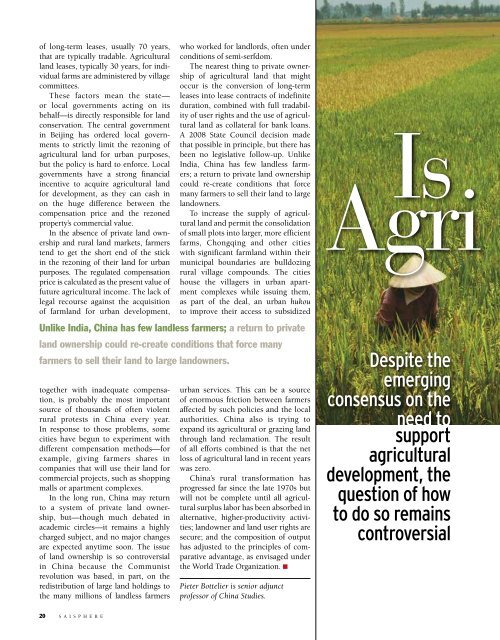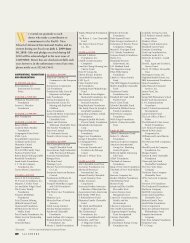Download Current Issue - SAIS
Download Current Issue - SAIS
Download Current Issue - SAIS
Create successful ePaper yourself
Turn your PDF publications into a flip-book with our unique Google optimized e-Paper software.
of long-term leases, usually 70 years,<br />
that are typically tradable. Agricultural<br />
land leases, typically 30 years, for individual<br />
farms are administered by village<br />
committees.<br />
These factors mean the state—<br />
or local governments acting on its<br />
behalf—is directly responsible for land<br />
conservation. The central government<br />
in Beijing has ordered local governments<br />
to strictly limit the rezoning of<br />
agricultural land for urban purposes,<br />
but the policy is hard to enforce. Local<br />
governments have a strong financial<br />
incentive to acquire agricultural land<br />
for development, as they can cash in<br />
on the huge difference between the<br />
compensation price and the rezoned<br />
property’s commercial value.<br />
In the absence of private land ownership<br />
and rural land markets, farmers<br />
tend to get the short end of the stick<br />
in the rezoning of their land for urban<br />
purposes. The regulated compensation<br />
price is calculated as the present value of<br />
future agricultural income. The lack of<br />
legal recourse against the acquisition<br />
of farmland for urban development,<br />
together with inadequate compensation,<br />
is probably the most important<br />
source of thousands of often violent<br />
rural protests in China every year.<br />
In response to those problems, some<br />
cities have begun to experiment with<br />
different compensation methods—for<br />
example, giving farmers shares in<br />
companies that will use their land for<br />
commercial projects, such as shopping<br />
malls or apartment complexes.<br />
In the long run, China may return<br />
to a system of private land ownership,<br />
but—though much debated in<br />
academic circles—it remains a highly<br />
charged subject, and no major changes<br />
are expected anytime soon. The issue<br />
of land ownership is so controversial<br />
in China because the Communist<br />
revolution was based, in part, on the<br />
redistribution of large land holdings to<br />
the many millions of landless farmers<br />
20 <strong>SAIS</strong>PHERE<br />
who worked for landlords, often under<br />
conditions of semi-serfdom.<br />
The nearest thing to private ownership<br />
of agricultural land that might<br />
occur is the conversion of long-term<br />
leases into lease contracts of indefinite<br />
duration, combined with full tradability<br />
of user rights and the use of agricultural<br />
land as collateral for bank loans.<br />
A 2008 State Council decision made<br />
that possible in principle, but there has<br />
been no legislative follow-up. Unlike<br />
India, China has few landless farmers;<br />
a return to private land ownership<br />
could re-create conditions that force<br />
many farmers to sell their land to large<br />
landowners.<br />
To increase the supply of agricultural<br />
land and permit the consolidation<br />
of small plots into larger, more efficient<br />
farms, Chongqing and other cities<br />
with significant farmland within their<br />
municipal boundaries are bulldozing<br />
rural village compounds. The cities<br />
house the villagers in urban apartment<br />
complexes while issuing them,<br />
as part of the deal, an urban hukou<br />
to improve their access to subsidized<br />
Unlike India, China has few landless farmers; a return to private<br />
land ownership could re-create conditions that force many<br />
farmers to sell their land to large landowners.<br />
urban services. This can be a source<br />
of enormous friction between farmers<br />
affected by such policies and the local<br />
authorities. China also is trying to<br />
expand its agricultural or grazing land<br />
through land reclamation. The result<br />
of all efforts combined is that the net<br />
loss of agricultural land in recent years<br />
was zero.<br />
China’s rural transformation has<br />
progressed far since the late 1970s but<br />
will not be complete until all agricultural<br />
surplus labor has been absorbed in<br />
alternative, higher-productivity activities;<br />
landowner and land user rights are<br />
secure; and the composition of output<br />
has adjusted to the principles of comparative<br />
advantage, as envisaged under<br />
the World Trade Organization. n<br />
Pieter Bottelier is senior adjunct<br />
professor of China Studies.<br />
Is<br />
Agri<br />
Despite the<br />
emerging<br />
consensus on the<br />
need to<br />
support<br />
agricultural<br />
development, the<br />
question of how<br />
to do so remains<br />
controversial



